Global Funeral Traditions: Examining Cross-Cultural Rites and Practices
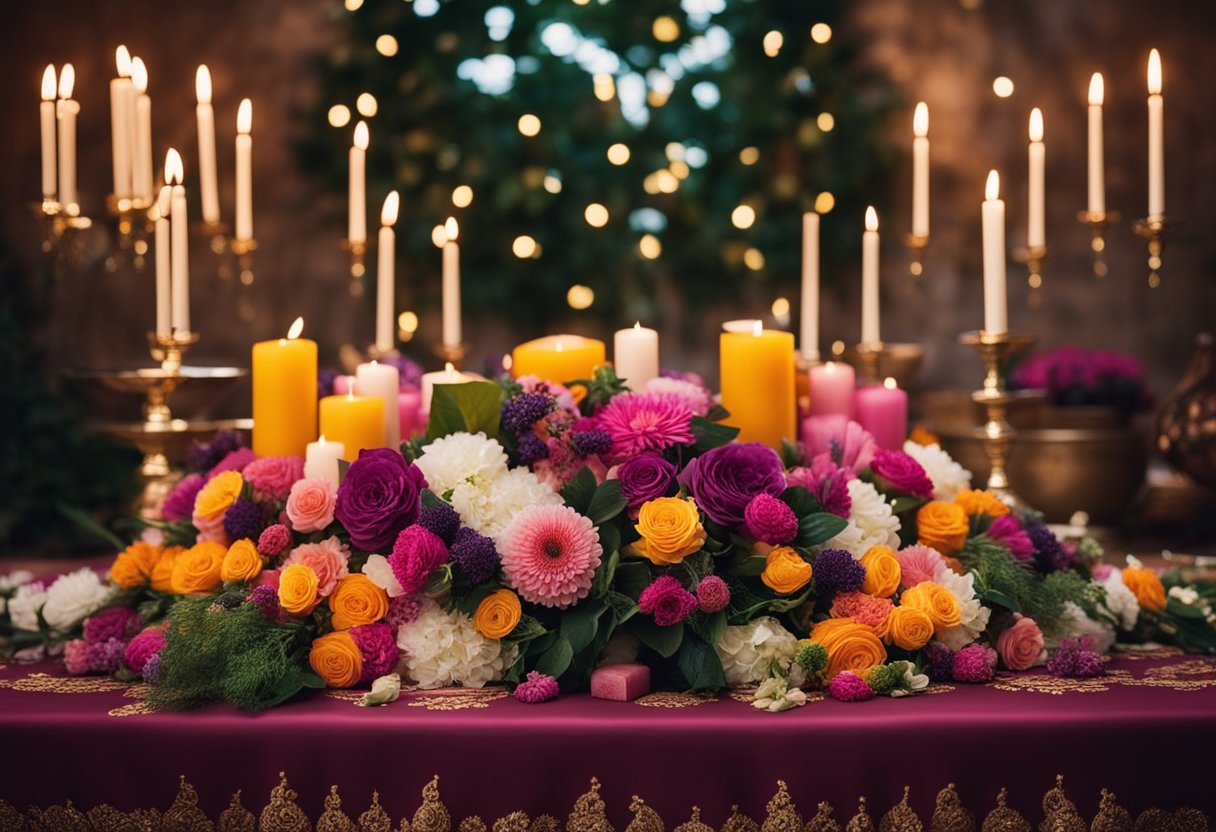
Updated On: April 23, 2024 by Eman Sameh
Funeral traditions are as diverse as the cultures they come from, each carrying its own unique practices and beliefs about life, death, and what lies beyond. In our exploration of global funeral traditions, we aim to shed light on how different cultures and religions around the world engage with the inevitable journey’s end. Research in anthropology and cross-cultural studies has shown that funerals are not just a way to bid farewell to loved ones but also a powerful reflection of the values, traditions, and religious beliefs of cultural groups.

Through a comparative study, we seek to understand the myriad ways in which societies commemorate the deceased. Be it burial or cremation, elaborate funeral rituals or simple, solemn goodbyes, these rites serve as a bridge that connects the living with the deceased, providing solace and signifying respect for those who have passed. We observe how grieving and support systems manifest across different societies and the underlying ethical considerations accompanying death rituals. We also consider how funerary traditions have adapted in times of crisis, such as during pandemics, and how the economics of death and the advent of innovations in funeral services affect the ways in which we mourn.
Cultural and Religious Foundations of Funeral Traditions
In exploring the underpinnings of global mourning customs, we must acknowledge the profound influence of cultural and religious beliefs on funeral traditions.
Understanding the Role of Culture and Religion
Our cultures and religions are the bedrock upon which mourning practices are built. They provide comfort and offer ways to honour those who have passed. The rituals and ceremonies performed during funerals are often steeped in tradition, embodying the values and historical experiences of a community.
- Culture: Within different societies, cultural norms dictate how grief is expressed and processed. Research indicates that cultural heritage significantly affects funeral rites, influencing everything from the method of body disposal to the duration and nature of mourning periods.
Religion: Many funeral practices are ingrained in religious doctrine, outlining specific procedures and rites to be performed. For instance, in Islam, the deceased is buried as soon as possible after death, leading to a prompt funeral service.
Christian traditions often revolve around the comfort of the bereaved and the hope of an afterlife, impacting the tone and structure of the funeral ceremonies.
The Diversity of Death and Mourning Practices
The vast array of mourning and funeral customs around the world is a testament to human diversity. Here are specific examples that reflect these practices:
- Ghana: In Ghanaian culture, especially within the Akan community, funerals are vibrant affairs with elaborate attire and public celebrations, reflecting the belief in life after death.
- United States: The melting pot of the United States has given rise to a blend of funeral traditions where individual preferences often shape the ceremonies, suggesting a culture that values personal expression even in death.
- Diverse religious practices add further layers to the mosaic of global bereavement customs. The Jewish tradition, for instance, includes a period called “sitting shiva,” where kin mourns for seven days, often at home.
By understanding these cultural and religious practices, we develop deeper insights into how societies across the globe cope with the universal experience of death and grief.
Funeral Rites Across the World
In this examination of global mortuary customs, we delve into the vast array of funeral traditions that reflect the cultural and religious diversity of human societies.
Comparison of Burial and Cremation
Burial: In Islamic tradition, burial is a swift and respectful process, with the deceased placed in the grave lying on their right side, facing the holy city of Mecca. Alternatively, Judaism dictates burial as well, typically occurring within 24 hours, honouring the belief in the sanctity of the human body.
Cremation: In contrast, Hinduism prescribes cremation as a method to release the soul from the physical body, facilitating its passage to the next life. Conversely, Buddhism emphasises simplicity and mindfulness, with cremation being common but not mandated, as the focus remains on reflecting on the impermanence of life.
Significant Funeral Practices from Different Cultures
- Hinduism: Significant rites include a complex series of rituals that may culminate in the scattering of ashes in a sacred body of water, signifying a return to the elements.
- Islam: Muslim funerals are marked by collective prayers called ‘Salat al-Janazah’, highlighting the communal aspect of mourning.
- Buddhism: Funerals often involve meditation and chanting as loved ones contemplate the transient nature of existence.
- Cultural Practices: Aboriginal mortuary rites in Australia entail a combination of ceremonies, including smoking ceremonies, to cleanse the spirit of the deceased.
Each ritual–whether burial or cremation, guided by religious doctrine or cultural tradition–reflects a universal engagement with the themes of death, mourning, and respect for those who have passed.
Grieving and Support Systems
In this section, we explore the varied emotional landscapes of mourning and the critical role community support plays in the healing process.
The Psychology Behind Mourning
Mourning is a deeply personal journey, yet it is shaped by the society in which we live. The act of grieving is both a psychological necessity and a social expression of loss. Emotionally, it encompasses a spectrum of feelings from sadness and anger to sometimes relief or guilt, reflecting the complex psychological processes at work during bereavement. The behaviours associated with mourning, which can include wearing specific clothes or participating in certain rituals, serve as an outward manifestation of the inner turmoil caused by loss.
Supporting the Bereaved and the Importance of Community
We understand that the bereaved require robust support networks to navigate the difficulties of loss. A community’s presence can provide comfort and a sense of belonging to those who are grieving. In various cultures, communities rally around the bereaved with actions and offerings that signify solidarity and compassion. Whether through social support mechanisms that ensure emotional coping or communal rituals that honour the deceased, societal involvement plays a pivotal role in the well-being of individuals facing grief. Such collectivist approaches help foster connections and can be instrumental in the healing process.
The Economics of Death
The economic implications of funerals are far-reaching, affecting individual finances and broader socio-economic structures. We’ll explore the financial burden these ceremonies often impose and how poverty interacts with funeral practices.
Examining the Economic Impact of Funerals
Funerals are not only cultural and emotional events but also significant economic occurrences. Across different societies, the expenses associated with them can be substantial. Preparing a funeral involves various services and resources, including the casket, venue, and ceremonial aspects. In many cultures, there is a social expectation to honour the deceased with a respectful farewell, which may translate into elaborate and costly rituals.
The economic magnitude of funerals can be highlighted by the fact that the death-care industry often sees a high influence of multinational corporations, leading to increased pricing and a shift in market dynamics. The economic impact of these services can add financial stress to grieving families, especially when not planned or budgeted for in advance.
Poverty and Funeral Expenses
Dealing with funeral expenses becomes particularly complex in the context of poverty. For many, the cost of a funeral can represent a significant economic hardship. In the United States, for instance, the average funeral cost can exceed $5,000, a figure that poses a challenge for families with limited financial means.
In various societies, those with fewer resources may have to seek alternative or less costly funeral arrangements, which can add to the emotional burden of losing a loved one. Despite the economic challenges faced, the cultural imperative to conduct a dignified funeral often remains, showcasing a stark contrast between economic realities and social expectations surrounding death.
Funeral Traditions in Times of Crisis
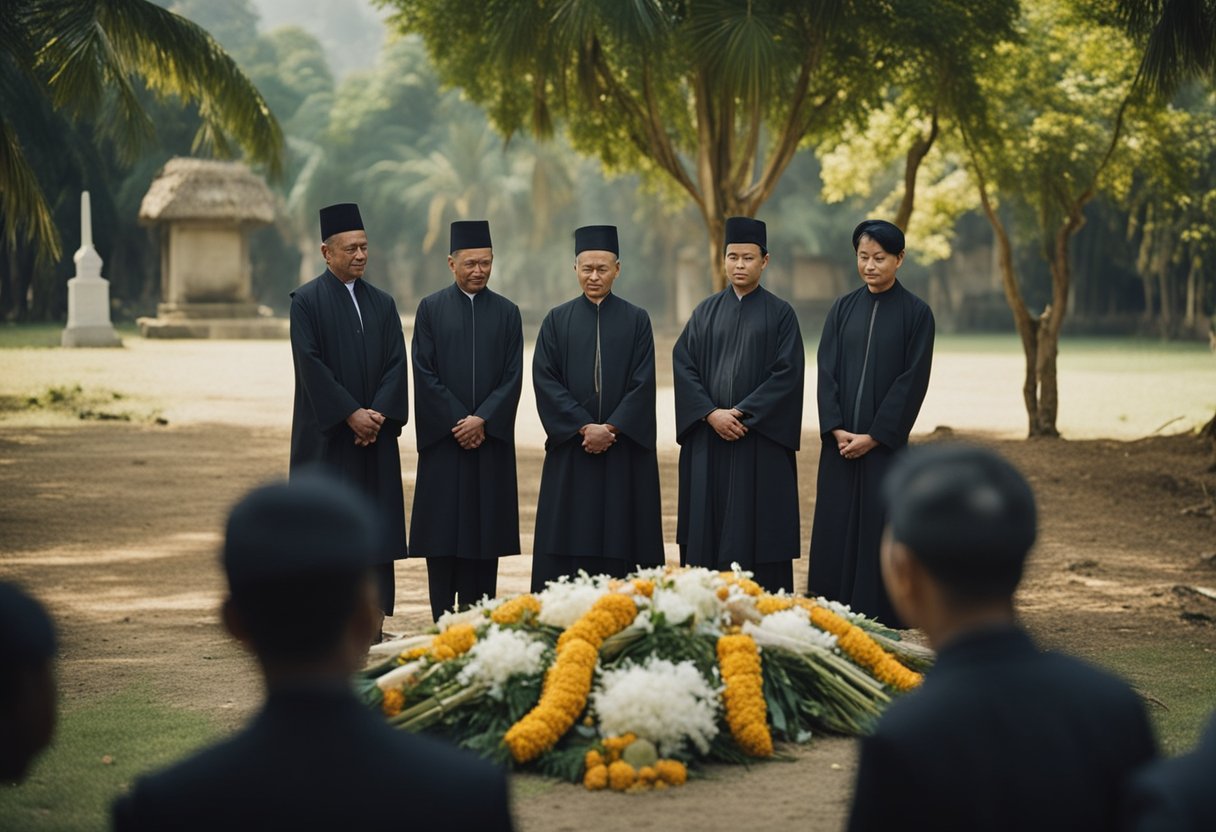
In times of crisis, the ways in which we mourn and honour the deceased face significant change, often leading to adaptations that have both cultural and emotional implications.
Impact of Global Events on Mourning Customs
Global events, such as natural disasters, wars, and pandemics, can drastically alter traditional mourning customs. Cultural norms may need to be amended rapidly in response to public health directives and the need for safety. For instance, during a health crisis, standard funeral practises may be suspended to prevent the spread of disease, profoundly affecting the bereaved families who rely on these rituals for closure and community support.
COVID-19 Pandemic and Funeral Services
The COVID-19 pandemic has had a profound impact on funeral services worldwide. Healthcare professionals and funeral directors were often placed in the difficult position of adjusting funerals to comply with health regulations. This resulted in limited attendance at services, quickened burial or cremation processes, and, in some cases, the complete elimination of traditional funeral rites. Despite these challenges, many bereaved families and communities explored alternative ways to commemorate their loved ones, such as virtual memorial services, demonstrating resilience and the deep human need to honour those we have lost.
Ethical Considerations in Death Rituals
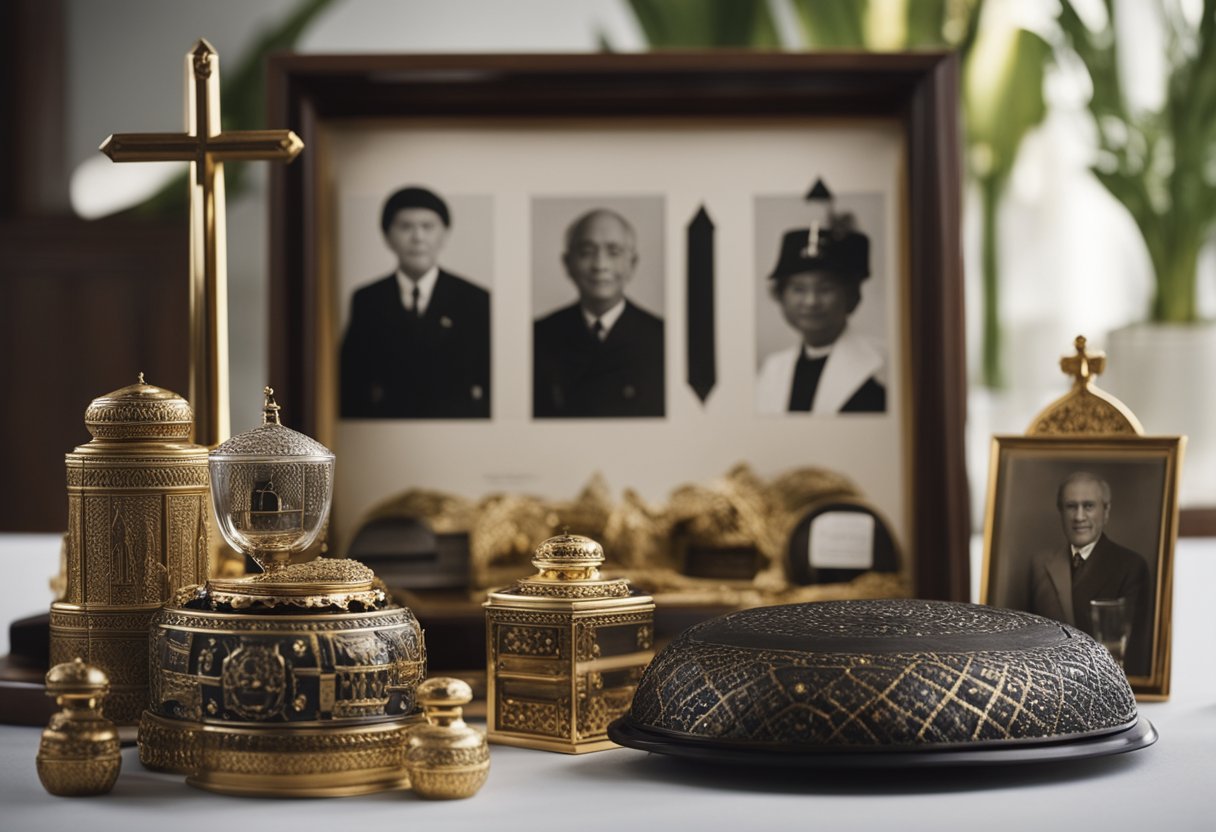
In exploring global funeral traditions, we must navigate the intricate balance between respect for the dead and the cultural imperatives that shape end-of-life customs. These ethical considerations require us to thoughtfully engage with the myriad ways different societies honour their deceased.
Respecting the Dead: Ethics and End-of-Life Customs
We must treat those who have passed away with dignity, a principle that remains consistent across cultures. Ethical treatment of the dead encompasses proper care of the body and respecting the bereavement practices of the deceased’s community. For instance, ensuring dignity for the deceased while protecting the living presents a significant ethical challenge, which becomes amplified during health crises like the COVID-19 pandemic. It requires sensitive negotiation between public health concerns and funerary rituals that are vital for the mourning process.
In many cultures, end-of-life rituals serve as an essential bridge between life and death, offering comfort to the grieving. Practices such as creating home altars in some countries or engaging in specific rites can be integral to the community’s healing. Paying close attention to these customs helps us comprehend the ethical dimensions that underpin them and reinforces our commitment to aligning our practices with the highest ethical standards.
Balancing Modernity and Tradition
As society evolves, so too do its funeral traditions, resulting in a delicate balance between modernity and tradition. This equilibrium is not merely about blending old and new but involves carefully considering how shifting practices affect the ethical tenets that guide us in honouring the dead.
We observe, for instance, the introduction of eco-friendly burial methods and their interplay with traditional burial customs. In some cases, mortuary workers must adapt to new protocols that cater to the community’s cultural and ethical needs while also considering modern considerations like environmental sustainability and changing legal frameworks.
In understating the balance between modern advancements and time-honoured customs, we face ethical decisions that include mitigating resource inequalities and ensuring funeral rites are accessible to all. It is about safeguarding the core cultural elements that define a community’s approach to death while embracing new practices that reflect our evolving ethical landscape.
Anthropological Perspectives on Funerals
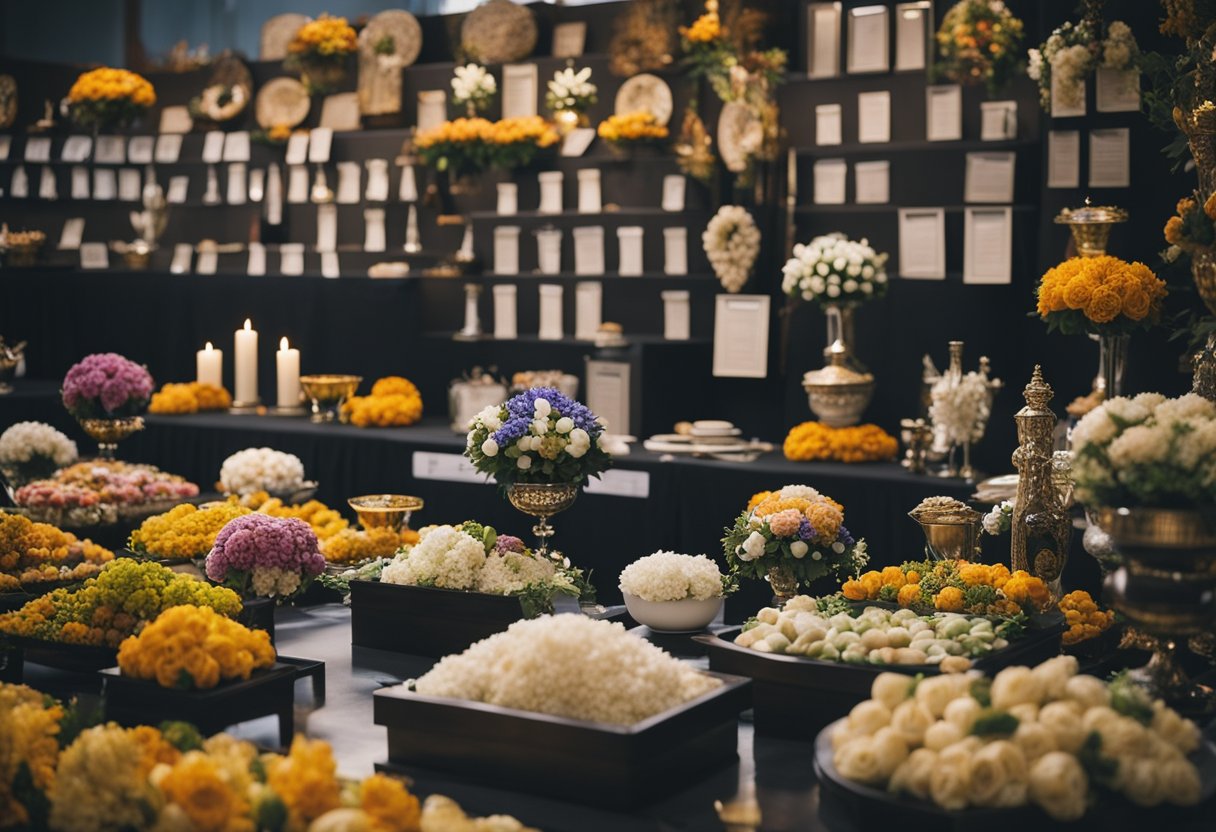
In examining global funeral traditions, we reveal the rich tapestry of death-related rituals that offer a window into societies’ cultural heartbeats. Our enquiry unravels the complex relationships between mourning practices and the living.
Comparative Analyses of Funeral Practices
Our research traverses continents to understand how funerals, as a reflection of sociocultural values, vary and yet often share underlying themes. Comparative analysis is indispensable, revealing both unique cultural expressions and universal patterns in death rituals. For instance, mortuary workers and bereaved families in West Timor adhere to rituals heavily influenced by COVID-19 mandates, highlighting adaptations in practices due to global events. Similarly, adults from 14 countries have reported diverse practices following a death, which range from keeping the door closed to walking funeral processions with a band. These insights are a reminder of humanity’s vast and varied approaches to honouring the dead.
Theoretical Approaches to Studying Death
In pursuing theoretical approaches to studying death, we hinge our analysis on the interplay of ethnographic research, which deepens our understanding of funeral practices. Anthropological enquiry into the rituals surrounding death has been influenced by a host of theoretical frameworks, from functionalism to symbolic interactionism. Studies like those exploring how modernization has changed the handling of deceased bodies elucidate the evolution and commercialization of death-related services. We consider how ethnographic perspectives contribute significantly to our comprehension of the myriad ways cultures grapple with loss and mortality. This scholarly work is critical in constructing a holistic view of the human experience of death and mourning.
Preservation of Funerary Traditions
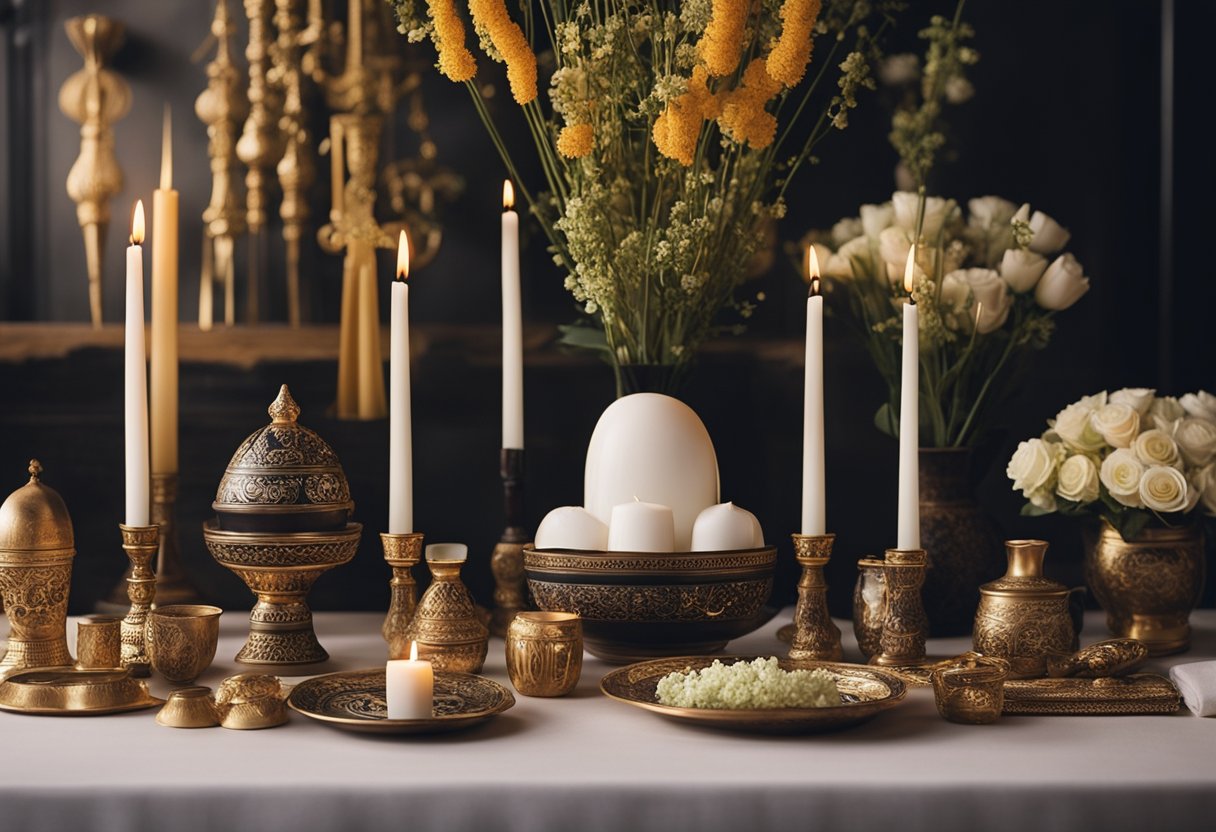
As we explore funeral and mortuary practices across cultures, we recognise their profound importance and the various challenges they face today.
The Significance of Preserving Funeral Customs
Funeral rituals have always played a crucial role in how societies handle death, encapsulating the culmination of a person’s life and cultural legacy. These customs are not merely procedures but hold deep significance for the community and the bereaved, providing comfort and a sense of continuity. For instance, embalming has both a preservative and a ceremonial function, reflecting the reverence for the deceased.
Traditional mortuary practices, such as creating home altars in some cultures, exemplify the connection between the living and the dead, allowing for an ongoing relationship even after death. These rituals not only help to honour the person’s memory but also reinforce cultural identity and cohesion.
Challenges to Traditional Mortuary Practices
The preservation of these practices faces several challenges, among which is the impact of globalisation. As societies become more interconnected, there is a tendency for cultural homogenisation that may dilute or even erase local customs. Additionally, rapid changes in technology and economy often mean that time-honoured traditions, such as handcrafted coffins or lengthy mourning periods, are under pressure to change or disappear.
Another significant challenge is adapting traditional practices to unforeseen circumstances, such as global health issues. For example, restrictions on gatherings have led to significant alterations in how funerals are conducted, with many unable to perform their rites as they once could.
In preserving funerary practices, it is essential to strike a balance between honouring tradition and adapting to modern and environmental norms. We must consider sustainable practices that respect both the deceased and our planet, supporting approaches that maintain cultural integrity while also embracing change when necessary.
Innovations in Funeral Services

As traditions evolve and societies become more environmentally conscious, innovations in funeral services are emerging. We’re seeing a shift towards sustainability and the use of technology in arranging funerals, reflecting new priorities and possibilities.
Green Funerals and Burial Alternatives
The concept of a green funeral aims to minimise environmental impact. This approach includes biodegradable coffins and burial beads, which are an alternative to traditional methods. In South Korea, for example, burial beads have become a popular choice due to limited cemetery space, with the remains being compressed into decorative beads. Additionally, funeral services have seen the introduction of funeral pyres, especially in cultures that value this age-old tradition, and now feature more eco-friendly designs.
The Rise of Technology in Funeral Arrangements
Technology has revolutionised how we plan and conduct funeral services. Online memorial services have gained popularity, allowing people to remember and share memories of their loved ones no matter where they are in the world. Additionally, the use of funeral webcasting helps include those who cannot attend in person due to distance or health concerns. Fantasy coffins, designed to reflect the deceased’s interests or achievements, also exemplify the intersection of tradition with modern innovation, creating a personalised remembrance experience.
Social and Psychological Processes in Mourning
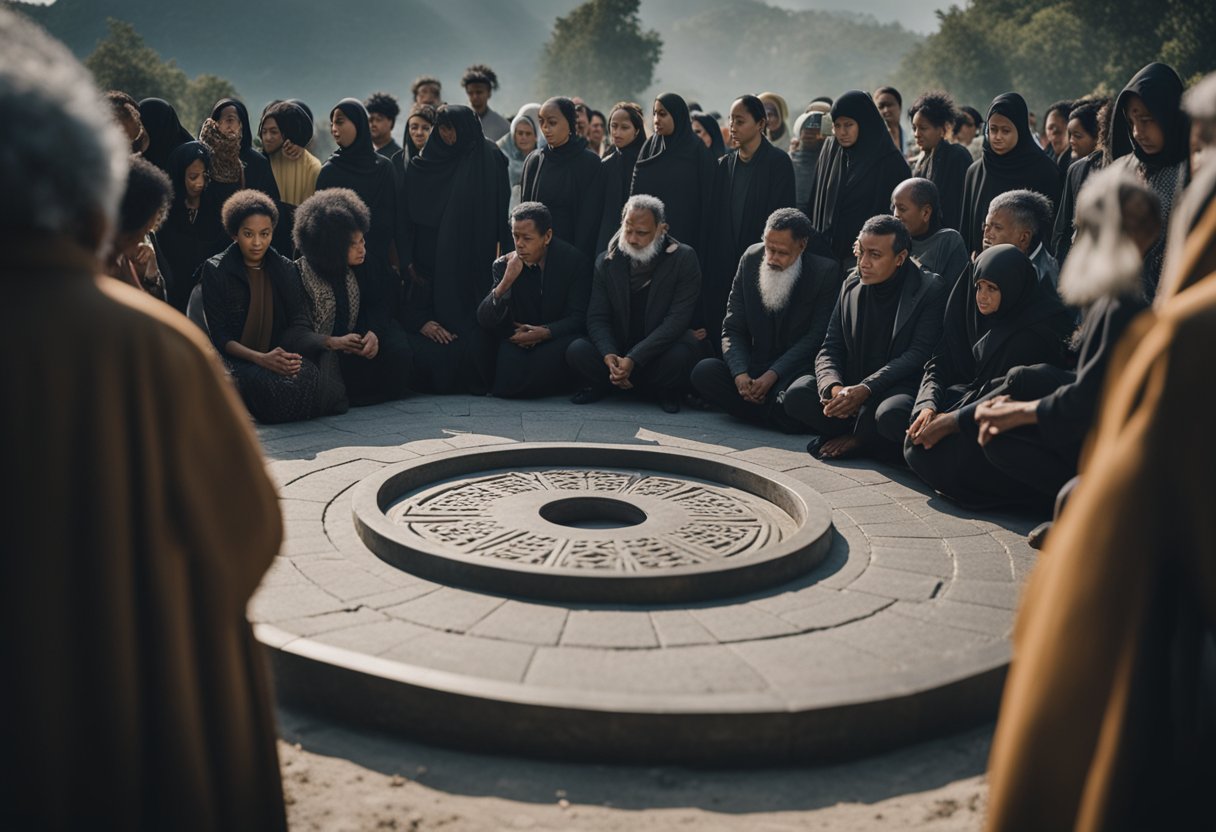
Mourning is a deeply personal yet universal phenomenon, comprising various psychological and social processes. Emotionally, grief is an internal feeling one experiences in response to loss, while mourning is the external expression of that grief, often encompassed by culturally specific mourning rituals.
Psychologically, mourning entails a broad spectrum of emotions, such as sadness, anger, guilt, or even relief. These emotions are part of the natural healing process. The psychological process of mourning is complex, potentially leading to a state known as grief. Grief is not linear, nor is it the same for everyone. It often involves cycles of disbelief, yearning, anguish, and, eventually, some level of acceptance.
From a social process perspective, cultures influence the expression of grief. For some, communal rituals validate the loss and provide a structure for the bereaved to navigate their grief. Others may encourage a more individualistic approach to mourning. The significance of these rituals shouldn’t be underestimated. They serve as a bridge between the living and the dead, reaffirming relationships and aiding the bereaved in adjusting to their loss. Funerals transformed in the twentieth century, epitomising the evolving nature of such social exchanges.
Grief work is a term coined to describe the process of coming to terms with loss. This may involve revising one’s mental models of the world to integrate the absence of the loved one, a task that can require significant time and emotional energy.
As we understand it, mourning is not merely an individual journey but one that is woven into the fabric of our societies, tethered to the Customs and beliefs that shape our very existence. And as we connect and empathise with bereavement across cultures, we uncover the shared human experience in its most raw and affecting form.
Frequently Asked Questions
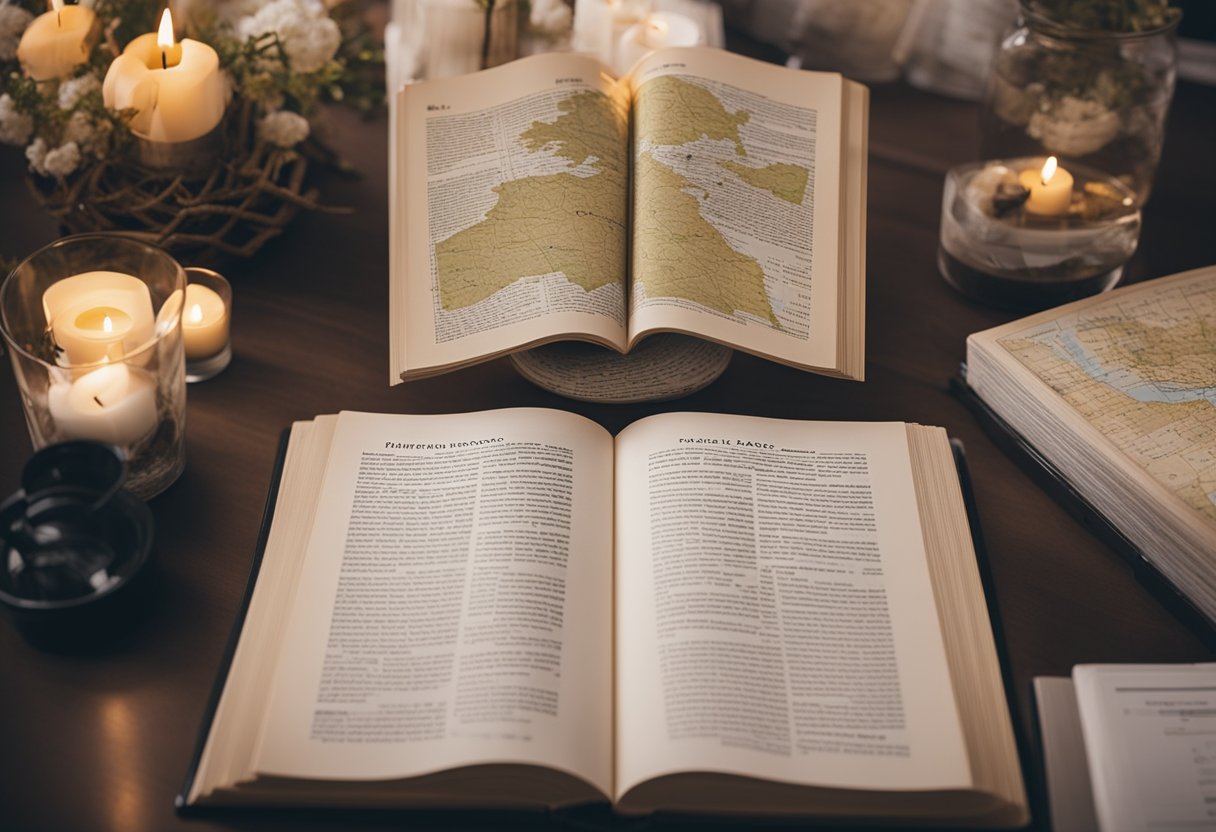
In this section, we’ll answer some of the most commonly asked questions about funeral traditions around the world. We’ll examine attire customs, the impact of cultural perspectives, and the diverse rituals that unite and distinguish global communities.
What are the common mourning attire customs across various Asian cultures?
In many Asian cultures, mourning attire typically involves sombre and conservative clothing. White is often worn during funerals to symbolise purity and mourning, notably in countries like China and India. In contrast, black is the customary mourning colour in Japan, signifying grief and formality.
In what ways do cultural perspectives on death influence funeral practices?
Cultural perspectives on death profoundly shape funeral practices. For instance, some cultures view death as a transition to another realm or a continuation of the spiritual journey, which is reflected in the elaborate rituals from different corners of the world. Others consider it a time to celebrate the life lived, leading to more festive and vibrant commemoration ceremonies.
How do death rituals vary between different religions worldwide?
Death rituals vary significantly among religions. In Christianity, ceremonies often include prayers, eulogies, and hymns, focusing on the hope of an afterlife. Islamic funerals involve bathing and shrouding the body, followed by a funeral prayer called Salat al-Janazah. Meanwhile, Hindus typically perform cremations alongside rites such as the lighting of the sacred fire and recitation of mantras.
Can you describe some of the unique funeral traditions found across the globe?
Globally, funeral traditions can be fascinatingly unique. In Madagascar, the tradition of ‘famadihana’ involves periodically exhuming the wrapped bodies of ancestors for re-wrapping and communal celebration. In Scotland, bagpipes often play at funerals, contributing to a distinctly Gaelic atmosphere. The Ga people of Ghana are known for crafting elaborate fantasy coffins that reflect the deceased’s life or interests.
What role does death play in American cultural attitudes and practices?
In American culture, death often initiates a period of reflection and commemoration, acknowledging the individual’s life achievements and contributions. Funerals serve as a space for family and friends to gather in support and remembrance. Due to the country’s cultural diversity, funerals frequently operate under the norms of Christian practices but also accommodate a plethora of other secular and religious customs.
How do funeral rituals reflect on the interconnectedness of local and global communities?
Funeral rituals illuminate the interconnectedness of communities by displaying shared values and human experiences. While local traditions may vary, the common threads of honouring the deceased, supporting the bereaved, and the symbolic acts of farewell demonstrate a global tapestry of mourning and remembrance. This interconnectedness reminds us of our collective humanity and the diverse ways in which we express respect for life and death.






